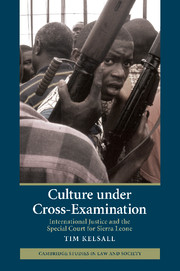Book contents
- Frontmatter
- Contents
- List of illustrations
- Preface
- 1 White man's justice? Sierra Leone and the expanding project of international law
- 2 The story of the CDF trial
- 3 An unconventional army: chains of command in a patrimonial society
- 4 Facts, metaphysics and mysticism: magical powers and the law
- 5 We cannot accept any cultural consideration: the child soldiers charge
- 6 ‘He's not very forthright’: finding the facts in a culture of secrecy
- 7 Cultural issues in the RUF, AFRC and Charles Taylor trials
- 8 Conclusion: from legal imperialism to dialogics
- References
- Index
3 - An unconventional army: chains of command in a patrimonial society
Published online by Cambridge University Press: 18 January 2010
- Frontmatter
- Contents
- List of illustrations
- Preface
- 1 White man's justice? Sierra Leone and the expanding project of international law
- 2 The story of the CDF trial
- 3 An unconventional army: chains of command in a patrimonial society
- 4 Facts, metaphysics and mysticism: magical powers and the law
- 5 We cannot accept any cultural consideration: the child soldiers charge
- 6 ‘He's not very forthright’: finding the facts in a culture of secrecy
- 7 Cultural issues in the RUF, AFRC and Charles Taylor trials
- 8 Conclusion: from legal imperialism to dialogics
- References
- Index
Summary
The Special Court charged the CDF defendants not only with individual responsibility for committing, ordering, planning, instigating, aiding and abetting criminal acts, but also with superior responsibility for crimes committed by their subordinates. In doing so, it drew on an identifiable stream of jurisprudence that ran from the Middle Ages in Europe, through the military tribunals at Nuremburg and the Far East, to the ad hoc tribunals for Rwanda and the former Yugoslavia. But despite being quite well established in international law, the doctrine of superior responsibility had yet to be applied to a society or a confl ict that was quite like Sierra Leone's. In particular, the historical fragility of formal authority relations and the pervasive nature of informal, patrimonial arrangements, while placing Sierra Leone together with many other Third World countries, differentiated it from other states previously the target of international trials, including even Rwanda. These facts notwithstanding, Fofana and Kondewa had, by the end of the trial, been found guilty as superiors for crimes in Bo, Koribundo and Bonthe. I begin the chapter by outlining some of the most important jurisprudence on command responsibility. Then I provide an overview of informal authority relations in peace and wartime Sierra Leone. Next, I summarise the testimony of two expert witnesses to the Special Court, one a British military expert, the other an American anthropologist, who debated the nature of command authority in the CDF.
- Type
- Chapter
- Information
- Culture under Cross-ExaminationInternational Justice and the Special Court for Sierra Leone, pp. 71 - 104Publisher: Cambridge University PressPrint publication year: 2009

